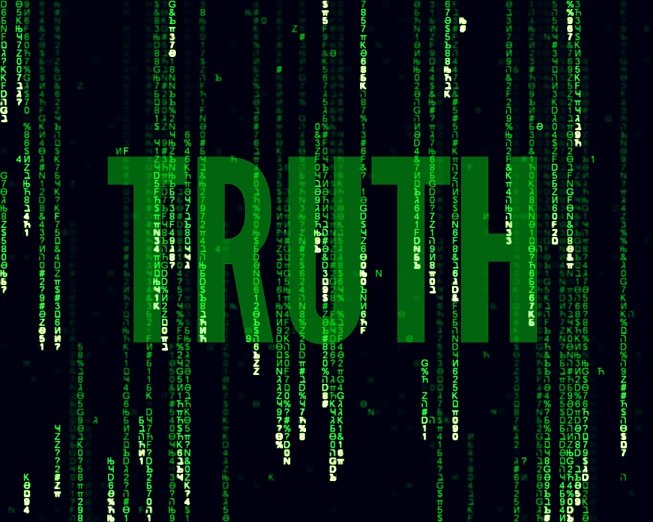
Both platforms are based on Ethereum, while Trutheum takes its name from the words Truth and Ethereum, Trive does the same from Truth and Hive. There are many substantial differences between these two, while both reward truth, Trutheum works based on Requests for Truth (RFT) and Trive reviews already existing news in an attempt to validate or refute its veracity.
Let’s review both projects by taking a careful look into their whitepapers, linked below. This is not a technical review, which means I won’t be explaining the mechanics in-depth, but the ideas sustaining the whole project.
Trutheum: a Network for Rewarding Truth
Trutheum applies the concept of truth as “factual proof to unanswered questions”, and proposes a platform to crowdfund rewards for those who come out with the truth regarding any kind of objective question.
DISCLAIMER: Finding news or any kind of recent information on Trutheum’s development has proven to be rather difficult, what makes me wonder if it’s still going. Regardless of that, the whitepaper is always available on its website.
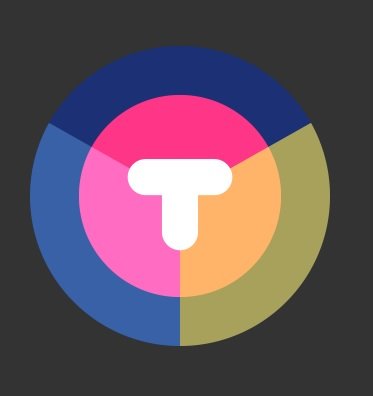
Background
Truth is under attack. Intentionally misleading citizens has historically been an effective strategy, not just for governments, but also for many industries and businesses. The only method to combat it is to have an informed population.
Truths are mainly revealed by altruism…
Trutheum’s solution to that problem (“not everyone is altruist”) is offering a different incentive -a monetary reward- for people to come out with the truth. The more important the matter at hand is for society, the bigger the reward, as more people will add money to it, what will in its turn create more attention and finally, media coverage.
Mechanism
The user will address a Request for Truth (RFT, basically a smartcontract) with a certain amount of tokens. If other users are interesting in see that particular truth revealed, they can add more tokens to the reward.
The RFT will then receive “reveals” that include the wallet address of the revealer, and URL to the supporting media and a Hash for that URL, to ensure it isn’t modified after submission.
Many different “reveals” can compete for the prize, so those paying the token to reveal the truth will vote on them and decide which Revealer wins the prize. (One token, one vote)
No Revealer: if no Revealer comes forward or the majority of tokens do not vote, they can be requested to be returned.
The “Reward After” contract: this type of contract doesn’t need a Request. The Revealer will publish a truth and a RFT at the same time. No votes are required.
It serves as an easy way to reveal a truth without any crowdfunding period and still request rewards for the community.
OBSERVATION: But if the truth is already out, what would be the incentive for users to reward the Revealer? I guess altruism…
Sybil Attacks:
The obvious way in which Trutheum RFTs could be attacked is by this kind of voting attack. Voting from multiple accounts, since each token represents one vote, could mean that a single entity could, in theory, achieve majority and win the reward for itself or the desired reveal.
This will not affect the reveal but only redirect the reward, since the reveals are public.
Their solution: 10% of the voters can contest the final outcome. If contested, the revealer who won the reward will only get 50% of it. Hence, an attacker would need to own more than 90% of the votes not to be contested, which is unrealistic in a scenario where there RTF is popular and the community large enough. But what if it isn’t popular?
The “Donald Trump Bounty”
In a recent video post, Chris Coney @marketingmonk from The Cryptoverse, made a very valid point based on an e-mail sent by the Trutheum team in which they introduced their first RFT, it is a test, of course, but a very telling one:
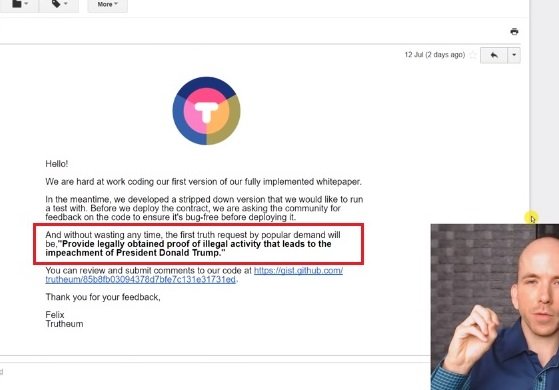
It reads: Provide legally obtained proof of illegal activity that leads to the impeachment of President Donald Trump.
As Mr. Coney observes (around minute 4:20): that’s not a request for truth, but a BOUNTY.
It starts by making an assumption, then asks for “proof of illegal activity” on it, and finally conditions the reward to a particular outcome that is not directly related to the task of revealing a fact or set of facts.
This is very disappointing!
(And I don’t like Trump, or Obama, or Clinton, they are all symptoms, if you ask me).
Last observations: the –rather short- whitepaper is not very well redacted. The logo and art are probably what I like the most about Trutheum, which is not necessarily a good thing.
Let's continue to...
Trive: Solving the Problem of Fake News
The truth is the truth no matter who speaks it.
Agreed.
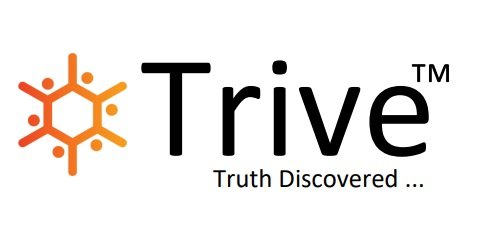
According to its whitepaper, Trive is a:
...social science engine that researches and clarifies facts through Human Swarmed Crowd Wisdom. We incent people to do primary research into news stories, compensate them with our own coin, Trive Coin, and hash/stash the results on the Block-Chain.
It uses game theory and a Nash Equilibrium incentive structure for researching news media and verify its contents.
Wisdom of the Crowds
The concept simply states that the decisions that result from the aggregation of information in a group will often be better than those any single member of that group. Individual judgment is tainted by “idiosyncratic noise”. Trial by jury can be understood as an example of this wisdom…
Trive’s whitepaper follows James Surowiecki’s work on the subject. He explains that the key to a rational “wise crowd” is:
Diversity of opinion – Each person should have private information, even if eccentric on the interpretation of facts.
Independence – People’s opinion should not be determined by the opinion of those around them.
Decentralization – People can specialize and draw on local knowledge.
Aggregation – Some mechanism exists for turning private judgments into a collective decision.
Mechanism
One of Trive’s goals is to create a “feedback loop” to media companies, which will lose revenue if their reporting isn’t honest. So we can understand their platform right away, let’s take a look at its web browser Plug-in at work:

As you can see, their plug-in will hide under a percentage of opacity that news classified as false, while those classified as true will be transparent. The scores will go from -100, a complete lie, to +100, totally true.
(The user can choose from 3 different options for visualization, in case it doesn’t like the opacity-based one, you can –for example- choose to not visualize news deemed false at all).
Trive’s “Game Mechanics” involves 5 kinds of “players”:
Consumers: they can send news for review to the “marketplace”, where they will be received by…
Curators: who bid on stories and publish a number of claims to be contested/ resolved by..
Researchers: incentivized to find and document convincing data quickly, so other researchers don’t win their reward first, then the…
Verifiers: that will be rewarded if they find errors in the researcher’s data, making it desirable for them to contest it. And finally…
Witnesses: who review the research and participate in the truth scoring process, earning a small fee.
Sybil Attacks:
In order to prevent this kind of attacks, Trive is implementing a Reputation System, pretty much like right here on Steemit.com! More responsible roles demand more reputation from users.
Trive is working this project on several phases, first, it will be centralized, as it will need its repository of news (Story Marketplace) to be seeded by the organization to function properly. On time it will go from centralized to decentralized, distributed and finally, peer-to-peer.
Here’s a detailed plan:
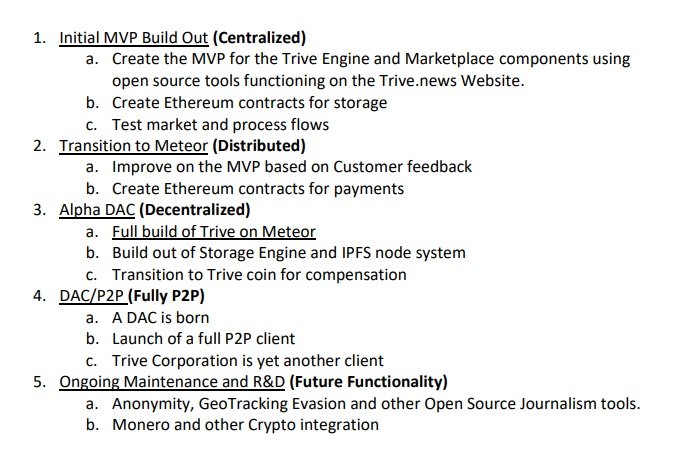
Trive also aims at making news verification faster, cheaper and easier, so media organizations would prefer its system to in-house verification.
Storage: Trive will use the InterPlanetary File System (IPFS) and incentive its users to run nodes for it.
Conclusion:
You can judge for yourself, I’m pretty sure you already did! In my opinion, Trive is a more serious platform, with a clearer idea on what purpose to achieve and how to achieve it. Their developers are visible (David Mondrus, CEO) and their ICO seems to be ongoing now.

Finally, I’m sharing this quote (below) because this is exactly what is taking place with Facebook censorship, and other centralized media as well. Blockchain-based platforms such as Trive or Trutheum (taking in consideration the negative features reviewed here) could bring transparency and neutrality to the process of fact-checking.
On the other hand, I believe the real solution to Fake News (as to propaganda in general) is culture, education, consciousness, and the independence of thought they bring.
When we believe something simply because it comes from “authority”, we are not free, we are subject to that authority, and I mean authority in a psychological way, for you it might be the New York Times, for others, a certain politician or journalist, or the State.
A system that controls the right of expression in the name of a supposed guarantee of the correctness and truthfulness of the information that society receives can be the source of great abuse and, ultimately, violates the right to information that this same society has.
Inter-American Court of Human Rights
Thanks for reading!
Written by Daniel Espinosa for his steemit.com blog, 2017.
source for first image
Fantastic post! I have been wondering if there were any projects like these in the works. I think this is one of the most important issues facing the world right now, and it really sucks that we even need this. But we do need this.
@originalworks
To call @OriginalWorks, simply reply to any post with @originalworks or !originalworks in your message!
For more information, Click Here! || Click here to participate in the @OriginalWorks sponsored writing contest(125 SBD in prizes)!!!
To enter this post into the daily RESTEEM contest, upvote this comment! The user with the most upvotes on their @OriginalWorks comment will win!Special thanks to @reggaemuffin for being a supporter! Vote him as a witness to help make Steemit a better place!
Thanks for bringing these interesting projects to our attention. I am going to be following the progress of Trive with a lot of interest.
Me too! I think it could work. Thanks for reading and commenting.